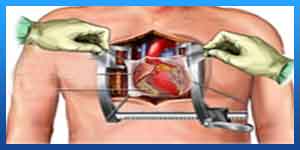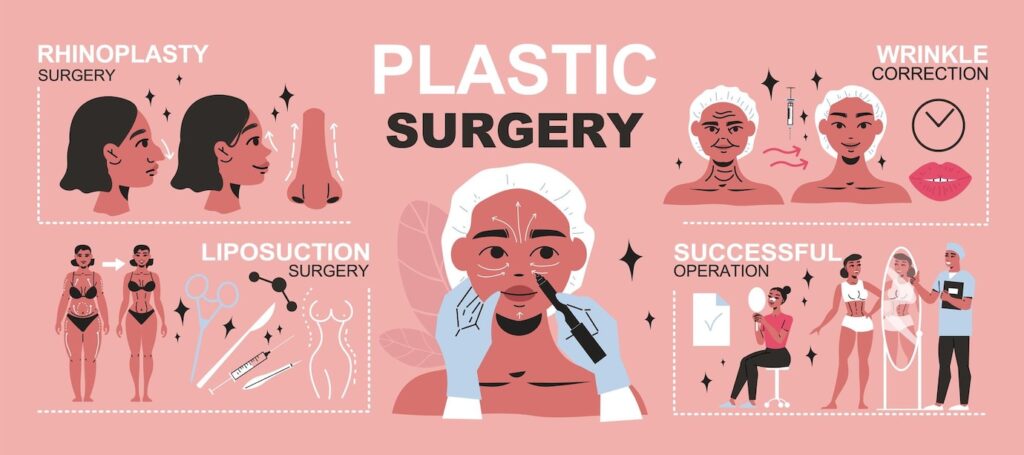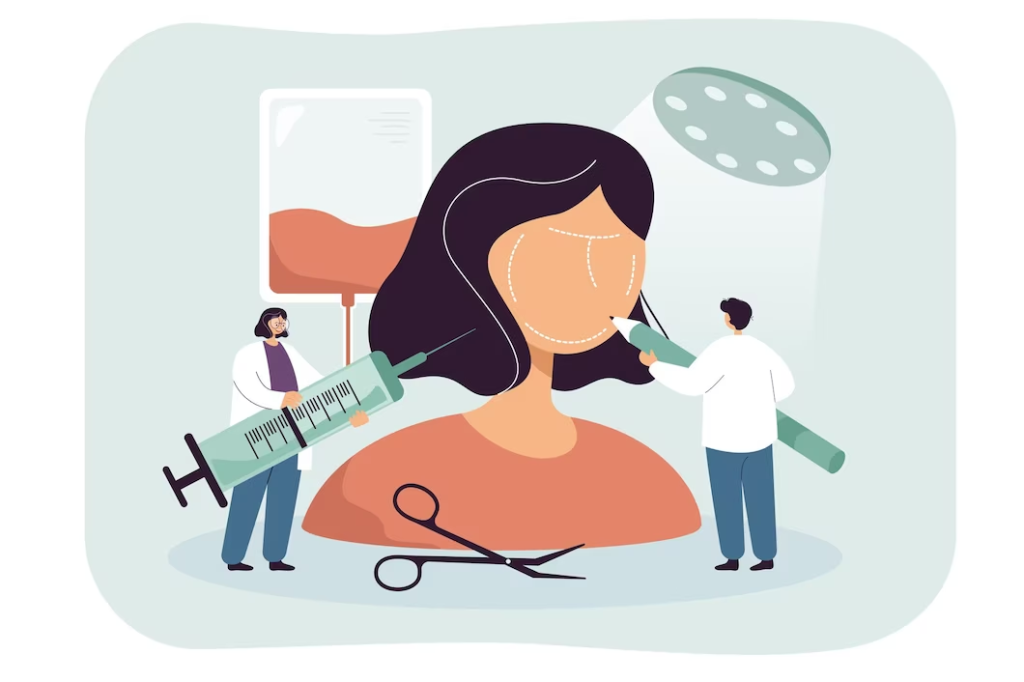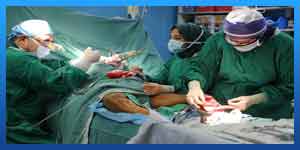Heart surgery can correct problems with the heart if other treatments haven’t worked or can’t be used. Over the last half-century, heart surgery in Iran has come a long way. Today, approximately 70,000 cardiac procedures are carried out every year in Iran, with coronary heart bypass, valvar, and aortic surgery being the most common types of cardiac surgery performed in Iran.
Open-heart surgery is a type of surgery where the chest is cut open and surgery is performed on the muscles, valves, or arteries of the heart. In fact, Open heart surgery is an operation to repair a fault or damage in the heart. The operation requires the surgeon to open the chest to access the heart. Open heart surgery is a widely performed operation in Iran. Each year 40,000 open-heart surgeries are performed in Iran. Almost all types of open heart surgery are performed in Iran including Coronary artery bypass grafting (CABG).

________________________________________________________________________________________
Plan your Heart surgery in Iran with the Best cardiologist surgeon.
Iranian Surgery is a medical tourism company in Iran that cooperates with the best cardiologist surgeon, specialists and hospitals in Iran and offers world-class treatments at an affordable cost.
_________________________________________________________________________________________
Read more about : Coronary artery bypass surgery (CABG) success story
Costs for open heart surgery in Iran vary depending on the type of procedure and other factors, but one thing is for sure: open-heart surgery costs one-fourth to one-tenth of the money you would have to fork out in, say, the U.S. or Australia.
The low cost of open heart surgery in Iran does not mean that the effectiveness or safety of the procedures is low. There are a lot of factors, mostly economic, that determine the prices of medical services, and open-heart surgery in Iran is no exception.
If you decide to have an Open-heart surgery in Iran, reading this article can improve your knowledge about cost of Open-heart surgery in Iran to a great extent and help you to choose the best city and hospital to perform Open-heart surgery in Iran.
In this article we provide you with a comprehensive description of Open-heart surgery in Iran and the cost of Open-heart surgery in Iran.


Arrival: We meet at the airport, take you to your hotel, and after some rest, the first appointment with your surgeon, X-ray or scans.
Arrival: We meet at the airport, take you to your hotel, and after some rest, the first appointment with your surgeon, X-ray or scans.


Aftercare and resting time, take your medication and do nose drops.
You have all day to yourself (you can go shopping, sightseeing walking, etc)


You have all day to yourself (you can go shopping, sightseeing walking, etc)
You have all day to yourself (you can go shopping, sightseeing walking, etc)


Second visit with the Doctor, removing the stitches and receiving instructions.
Departure

The following table describes general information about Open-heart surgery in Iran including Open-heart surgery cost in Iran, recovery time, and to name but a few.
| General Information | |
| Cost | Start from $ 3800 |
| Anesthesia | General |
| Hospital Stay | 7-10 Days |
| Back to Work | 4 Weeks |
| Duration of Operation | 3-6 Hours |
| Minimum Stay in Iran | 4 Weeks |
Read more about : Kidney transplant
Iranian surgery is an online medical tourism platform where you can find the best Cardiothoracic Surgeons in Iran. The price of an open-heart surgery in Iran can vary according to each individual’s case and an in-person assessment with the doctor and will be determined based on gender, age, whether or not the surgery is a reoperation and whether the patient experiences postoperative complications. So if you are looking for the cost of open-heart surgery in Iran, you can contact us and get free consultation from Iranian surgery.

Open-heart surgery is a type of surgery where the chest is cut open and surgery is performed on the muscles, valves, or arteries of the heart. In fact, Open heart surgery is an operation to repair a fault or damage in the heart. The operation requires the surgeon to open the chest to access the heart.
Coronary artery bypass grafting (CABG) is the most common type of heart surgery done on adults. Open-heart surgery is sometimes called traditional heart surgery.
Read more about : Heart transplant
. Preparation for open heart surgery starts the night before. A person should eat an evening meal as usual but must not consume any food or drink after midnight.
. It is a good idea to wear loose, comfortable clothing to assist with restricted movement following surgery, but wear whatever is comfortable.
. It is normal to feel anxious before an anesthetic, and people should not hesitate to seek reassurance from the healthcare team.
. The doctor may request that the person washes their upper body with antibacterial soap. A member of the healthcare team may need to shave the person’s chest area before they can have the anesthetic.
. The doctors may also need to run tests before surgery, such as monitoring the heart or taking blood samples. A doctor or nurse might place a line into a vein to enable the delivery of fluids.
. After the medical team has completed the preliminary tasks, the anesthesiologist will administer general anesthesia.
. Tell your doctor about any drugs you are taking, even over-the-counter medications, vitamins, and herbs. Inform them of any illnesses you have, including herpes outbreak, cold, flu, or fever.
. In the two weeks before the surgery, your doctor may ask you to quit smoking and stop taking blood-thinning medications, such as aspirin, ibuprofen, or naproxen.
. It’s important to talk to your doctor about your alcohol consumption before you prepare for the surgery. If you typically have three or more drinks a day and stop right before you go into surgery, you may go into alcohol withdrawal. This may cause life-threatening complications after open-heart surgery, including seizures or tremors. Your doctor can help you with alcohol withdrawal to reduce the likelihood of these complications.
. The day before the surgery, you may be asked to wash yourself with a special soap. This soap is used to kill bacteria on your skin and will lessen the chance of an infection after surgery. You may also be asked not to eat or drink anything after midnight.
. Your healthcare provider will give you more detailed instructions when you arrive at the hospital for surgery.
Open-heart surgery may be done to perform a CABG. A coronary artery bypass graft may be necessary for people with coronary heart disease.
Coronary heart disease occurs when the blood vessels that provide blood and oxygen to the heart muscle become narrow and hard. This is often called “hardening of the arteries.”
Hardening occurs when fatty material forms a plaque on the walls of the coronary arteries. This plaque narrows the arteries, making it difficult for blood to get through. When blood can’t flow properly to the heart, a heart attack may occur.
Open-heart surgery is also done to:
. Repair or replace heart valves, which allow blood to travel through the heart
. Repair damaged or abnormal areas of the heart
. Implant medical devices that help the heart beat properly
. Replace a damaged heart with a donated heart (heart transplantation)
Read more about : Heart attack causes
Read more about : Angiogram procedure
Read more about : Echocardiogram
Risks for open-heart surgery include:
. Chest wound infection (more common in patients with obesity or diabetes, or those who’ve had a CABG before)
. Heart attack or stroke
. Irregular heartbeat
. Lung or kidney failure
. Chest pain and low fever
. Memory loss or “fuzziness”
. Blood clot
. Blood loss
. Breathing difficulty
. Pneumonia
According to the Heart and Vascular Center at the University of Chicago Medicine, the heart-lung bypass machine is associated with increased risks. These risks include stroke and neurological problems.

According to the National Institutes of Health Trusted Source, a CABG takes from three to six hours. It’s generally done following these basic steps:
The patient is given general anesthesia. This ensures that they will be asleep and pain free through the whole surgery.
. The surgeon makes an 8- to 10-inch cut in the chest.
. The surgeon cuts through all or part of the patient’s breastbone to expose the heart.
. Once the heart is visible, the patient may be connected to a heart-lung bypass machine. The machine moves blood away from the heart so that the surgeon can operate. Some newer procedures do not use this machine.
. The surgeon uses a healthy vein or artery to make a new path around the blocked artery.
. The surgeon closes the breastbone with wire, leaving the wire inside the body.
. The original cut is stitched up.
Sometimes sternal plating is done for people at high risk, such as those who’ve had multiple surgeries or people of advanced age. Sternal plating is when the breastbone is rejoined with small titanium plates after the surgery.
Read more about : Balloon Valvuloplasty Surgery
Read more about : Coronary Angiography
When you wake up after surgery, you will have two or three tubes in your chest. These are to help drain fluid from the area around your heart. You may have intravenous (IV) lines in your arm to supply you with fluids, as well as a catheter (thin tube) in your bladder to remove urine.
You will also be attached to machines that monitor your heart. Nurses will be nearby to help you if something should arise.
You will usually spend your first night in the intensive care unit (ICU). You will then be moved to a regular care room for the next three to seven days.
Taking care of yourself at home immediately after the surgery is an essential part of your recovery.
Incision care is extremely important. Keep your incision site warm and dry, and wash your hands before and after touching it. If your incision is healing properly and there is no drainage, you can take a shower. The shower shouldn’t be more than 10 minutes with warm (not hot) water. You should ensure that the incision site isn’t hit directly by the water. It’s also important to regularly inspect your incision sites for signs of infection, which include:
. Increased drainage, oozing, or opening from the incision site
. Redness around the incision
. Warmth along the incision line
. Fever
Pain management is also incredibly important, as it can increase recovery speed and decrease the likelihood of complications like blood clots or pneumonia. You may feel muscle pain, throat pain, pain at incision sites, or pain from chest tubes. Your doctor will likely prescribe pain medication that you can take at home. It’s important that you take it as prescribed. Some doctors recommend taking the pain medication both before physical activity and before you sleep.
Some patients experience trouble sleeping after open-heart surgery, but it’s important to get as much rest as possible. To get better sleep, you can:
. Take your pain medication a half hour before bed
. Arrange pillows to decrease muscle strain
. Avoid caffeine, especially in the evenings
In the past, some have argued that open-heart surgery leads to a decline in mental functioning. However, most recent research has found that not to be the case. Though some patients may have open-heart surgery and experience mental decline later on, it’s thought that this is most likely due to the natural effects of aging.
Some people do experience depression or anxiety after open-heart surgery. A therapist or psychologist can help you manage these effects.
Expect a gradual recovery. It may take up to six weeks before you start feeling better, and up to six months to feel the full benefits of the surgery. However, the outlook is good for many people, and the grafts can work for many years.
Nevertheless, surgery does not prevent artery blockage from happening again. You can help improve your heart health by:
. Eating a healthy diet
. Cutting back on foods high in salt, fat, and sugar
. Leading a more active lifestyle
. Not smoking
. Controlling high blood pressure and high cholesterol
Cardiothoracic surgeons in Iran can help you in making your final decision about what type of Open-heart surgery is more suitable for you.
It is important that you seek the assistance of experienced and skilled cardiothoracic surgeons in Iran who have provided a suitable condition for people with limited budgets to do open-heart surgery in Iran easily. It is worth explaining that the quality provided by Iranian surgeons is far higher than other countries including Turkey and India.
Cardiothoracic surgeons in Iran, have performed numerous procedures annually which make cardiothoracic surgeons in Iran more experienced than other countries’ surgeons, due to low cost of open-heart surgery in Iran, thousands of people travel to Iran every year so that they can undergo open-heart surgery in Iran with the best Cardiothoracic surgeons at an affordable and reasonable price.
The factors that the best cardiothoracic surgeons should have:
Because of performing a great number of procedures, they become knowledgeable and highly skilled which make them very famous worldwide.
It is of paramount importance that your surgeon be expert in various types of open-heart surgery.
We are happy to introduce a great number of Iranian surgeons who have all two above-mentioned features.
The analysis indicates the most important factors affecting costs and outcomes are gender, age, whether or not the surgery is a reoperation and whether the patient experiences postoperative complications and the cost starts from $ 3800 in Iran.


